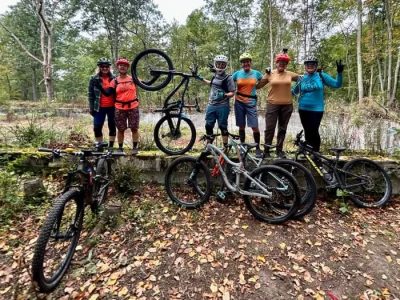
We’re pleased to feature an exciting new partnership! On CT Trail Finder, Quiet Corner New England Mountain Bike Association (QCNEMBA) helped publish Pomfret Forest, an extensive multi-use trail system directly off the Air Line State Park Trail in Pomfret, that they have designed with mountain bikers in mind. Many thanks to Christian Smutnick, QCNEMBA Vice President, for speaking with me about their recent work building, maintaining, and connecting folks to trails in the northeast corner of CT.
QCNEMBA shares our goal of increasing trail accessibility – such as with our interactive trail maps open for anyone to access from a web browser. They often map their own trails, which helped streamline CT Trail Finder map preparation. They are also interested in connections between trails and local businesses through tourism, tying in with our trailside services. QCNEMBA is active with unique programs, such as Wednesday Women’s rides (pictured here), and Gear Locker, in which used mountain bikes are donated, quality-assessed, and lent to new riders to help reduce initial cost barriers.
Pomfret Forest is a victory for QCNEMBA, and an awesome addition to CT Trail Finder – go check it out!